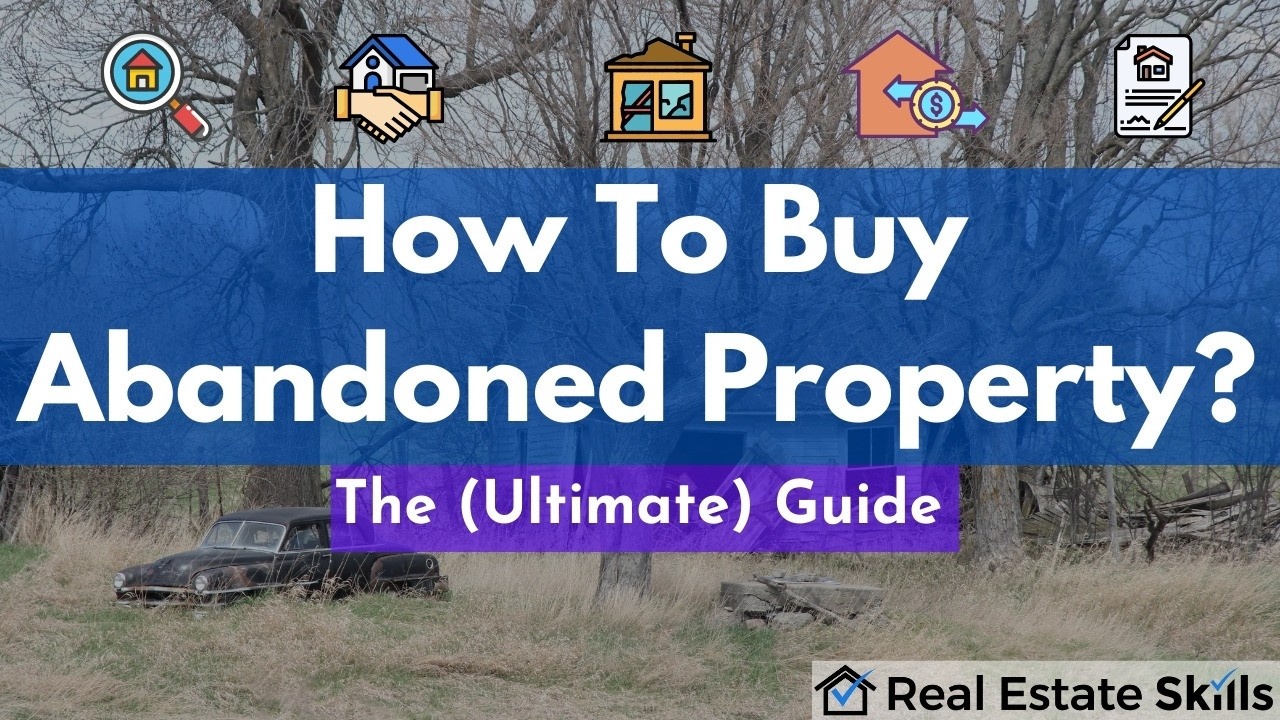The realm of real estate investment holds a plethora of opportunities, one potentially profitable yet often overlooked avenue being the acquisition of abandoned properties. The endeavor not only provides an opportunity for significant financial gain but also allows investors to contribute positively to community development by rehabilitating neglected spaces. However, embarking on this journey requires a comprehensive understanding of the process and its complexities.
This article serves as a guide to navigate the intricate path to purchasing abandoned property. It offers insights into identifying potential locations, conducting thorough research and due diligence, understanding legalities involved, formulating offers, closing deals successfully and considerations after purchase. With this knowledge in hand, both seasoned investors and beginners can approach this unique aspect of real estate with confidence and competence.
Understanding Abandoned Real Estate
Delving into the realm of abandoned real estate requires a comprehensive understanding of the complex legal, financial, and physical aspects that surround these seemingly forgotten assets. Abandoned property investment is not merely about finding deserted homes or buildings; it involves identifying opportunities where value can be added and profits realised. Understanding the dynamics of abandoned real estate opportunities entails an appreciation for market trends, changes in demographics, fluctuating economic conditions, along with a keen eye for spotting potential deals in unlikely places. It is this intricate balance between risk and reward that makes investing in abandoned properties intriguing.
The appeal of buying abandoned homes for sale lies in their potential to provide lucrative returns on investment if approached correctly. These properties often come at relatively low prices compared to inhabited homes on the market because they are typically sold as-is without any guarantees regarding their condition or viability. However, just as there could be compelling bargains within this niche segment of the housing market, there are also inherent risks involved. Prospective buyers must thoroughly assess these risks before entering into any deal—carefully inspecting each property’s structural integrity and historical records while simultaneously evaluating its feasibility from a financial perspective.
Purchasing abandoned property deals is no simple task and requires diligent research coupled with a deep understanding of local real estate patterns. Gathering valuable insights about the regional abandoned property market can aid investors significantly when making purchasing decisions—helping them determine which properties have potential for profitable resale or rental revenue streams based on location-specific factors such as population growth rates or future development plans. The next section explores some essential legalities one needs to consider for How To Buy Abandoned Property to ensure smooth transactions and avoid unnecessary complications later on.
Legalities to Consider
Navigating the legal intricacies associated with acquiring neglected real estate assets necessitates a comprehensive understanding of relevant laws and regulations. Buying distressed properties often involves complex procedures that may be subject to specific local, state or federal laws. It is crucial to familiarize oneself with these laws before embarking on property turnaround tactics, as lack of knowledge can potentially lead to costly mistakes or legal issues. For instance, some jurisdictions require a lengthy waiting period before an abandoned property can legally be purchased, while others may have strict rules regarding the rehabilitation and resale of such properties.

In the realm of accelerated real estate sales, one cannot overlook due diligence in matters concerning title searches. A thorough title search will reveal if there are any outstanding liens or encumbrances on the property which could complicate matters substantially for potential investors. Furthermore, it’s important not just to verify the status of taxes owed on an abandoned property but also understand its zoning restrictions and building codes as they could affect renovation plans integral to your quick house flipping guide.
Selling tips for abandoned houses often emphasize the importance of having a solid exit strategy in place before investing in these types of properties. This includes understanding market trends and ensuring that there will be demand for the rehabilitated property once it has been restored. Making informed decisions based on careful research not only optimizes potential profits but also mitigates risks associated with investing in abandoned properties. As this discussion transitions into finding potential properties, remember that successful investment requires balancing thorough research with strategic action.
Finding Potential Properties
Identifying prospective real estate assets for investment necessitates the consideration of multiple factors, including location, market conditions, and potential return on investment. One promising avenue can be purchasing abandoned properties. These often undervalued assets offer opportunities for speedy property transactions and fast cash for houses. The process of acquiring such properties involves not just buying and selling distressed homes but also requires a keen understanding of the local real estate market to sell your house quickly.
The following table presents three effective strategies to locate potential abandoned properties:
| Strategy | Description |
|---|---|
| Local Government Listings | Many municipalities list tax-defaulted properties that are potentially abandoned. This is an excellent resource for house flipping beginners. |
| Online Real Estate Marketplaces | Numerous online platforms specialize in foreclosed or distressed homes listings which may include abandoned properties as well. |
| Direct Outreach | Contacting property owners directly through public records can reveal unlisted opportunities; this method demands more effort but could yield unique finds |
To successfully navigate the complex landscape of real estate investment, one must have a deep understanding of these strategies and their implications on both short-term actions as well as long-term objectives. Therefore, it’s crucial that those interested in buying and selling distressed homes consider these methods when searching for suitable investments.
While finding potential properties is essential, so too is conducting comprehensive research on chosen targets. A thorough examination of legal documents, exploration into past ownership issues, inspection against structural damages – all these elements form part of the due diligence required when dealing with abandoned property purchases. In essence, it’s about ensuring any investments made are sound ones — financially and legally — before proceeding with acquisition efforts.
Research and Due Diligence
Conducting meticulous research and performing rigorous due diligence are indispensable steps in the process of acquiring potentially deserted real estate assets. This phase offers a platform to uncover any hidden issues, legal entanglements, or debts pertaining to the property that might have spurred its abandonment. It also provides an opportunity to evaluate the potential of the property for a quick sale by applying fast home selling strategies.

- Firstly, understanding the local real estate market is crucial. By assessing recent sales data and selling houses in a competitive market, one can gauge the potential price range and demand for similar properties.
- Secondly, investigating the legal status of an abandoned house includes confirming its ownership status and determining if there are any liens or unpaid taxes associated with it. These factors can significantly impact rapid real estate transactions.
- Lastly, evaluating physical conditions is essential as it directly influences tips for selling a house fast. A thorough inspection can reveal needed repairs or maintenance issues which could detract from immediate resale value.
After comprehensive research and due diligence have been performed on every aspect of the property—from its current condition to potential return on investment—one is armed with invaluable knowledge necessary to proceed with confidence. Such information will not only inform about possible challenges but also suggest best practices for addressing them effectively in order to expedite a successful purchase transaction. Armed with this information, one moves closer towards making an informed decision regarding whether or not to extend an offer on such idle assets without unnecessary delay.
Making an Offer
Upon successful completion of the due diligence process, the next critical step involves crafting a competitive and attractive offer for the unoccupied real estate asset under consideration. This phase requires a comprehensive understanding of real estate market trends, local property values, and financial viability. Prospective buyers must also contemplate factors such as renovation costs, potential profit margins, and timelines for project completion to ensure the investment is feasible.
The table below outlines key considerations in making an attractive offer:
| Key Considerations | Description |
|---|---|
| Market Trends | Understand current market conditions and future predictions; this will determine if it’s a buyer’s or seller’s market. |
| Local Property Values | Research comparable properties in the area to get an idea of what similar homes are selling for. |
| Renovation Costs | Calculate potential repair costs that may be required to bring the property up to standard. |
| Profit Margins | The difference between purchase price and selling price should be substantial enough to cover all costs with a desirable profit left over. |
| Project Timelines | Establish realistic timelines for project completion based on resources available; this can influence your bargaining power during negotiation. |
Meticulous analysis of these elements can enable prospective buyers to make informed decisions while negotiating with sellers or their representatives. Buyers who demonstrate knowledge about local market conditions, understand renovation implications and have clear projections about profitability stand better chances at securing favorable deals.
Navigating through these stages paves way towards finalizing agreements and contracts – essential processes that solidify transactions into legally binding arrangements which shall be discussed in detail in subsequent sections about closing deals on abandoned properties without using ‘step’.
Closing the Deal
Finalizing the transaction on the unoccupied real estate asset involves several critical steps, including closing the deal which requires careful consideration and meticulous attention to details. This phase is often conducted at a title company or attorney’s office and encompasses multiple aspects like signing of documents, payment of fees, and transfer of ownership. It is crucial that all legal documentation is reviewed for accuracy prior to signing, as any errors could lead to complications down the line.

- The process usually includes:
- Reviewing and Signing Documents: At this stage, it is vital to thoroughly review each document before signing. These typically include a deed transferring ownership from seller to buyer, a settlement statement outlining final costs for both parties, and mortgage documents if financing was involved.
- Payment of Fees: All applicable fees such as earnest money deposit, down payment (if necessary), closing costs (which may include appraisal fee, home inspection fee etc.), must be paid during this time. Often these are rolled into one lump sum that needs to be paid via certified check or wire transfer.
- Transfer of Ownership: Once funds have been exchanged and papers signed, the property legally changes hands from seller to buyer. Keys are handed over along with any other relevant information about the property.
The importance of ensuring every detail has been attended to in order for a smooth transition cannot be overstated. Errors in paperwork can lead to disputes over property lines or even potential legal action from other parties claiming interest in the property—issues that could take significant time and resources away from developing or selling your new acquisition. While it might seem overwhelming at first glance, breaking down each part makes them more manageable. With diligence during this phase not only ensures an investment’s security but also prepares one adequately for what lies ahead after acquiring abandoned properties—a journey filled with unique opportunities but also responsibilities attached thereto.
Post-Purchase Considerations
Having navigated the complex process of closing a deal on an abandoned property, attention must now be turned to post-purchase considerations. This phase is equally important as it involves planning and executing necessary actions after acquiring the property.
Post-purchase considerations encompass a broad range of activities that are vital for creating value from the recently purchased abandoned property. It includes assessing and repairing any structural damages, ensuring compliance with local building codes, dealing with potential legal issues such as liens or ownership disputes, and creating a strategy for future use of the property. The new owners may also need to evaluate potential costs associated with these activities and consider whether they will manage renovations themselves or hire professionals. Furthermore, gaining an understanding of market trends in the area can prove beneficial in determining whether to rent, sell or repurpose the property.
Regardless of what decisions are made regarding future plans for the property, it remains imperative to ensure all actions follow applicable laws and regulations. These measures help not only protect against unforeseen legal complications but also contribute towards maximizing return on investment. The journey through purchasing an abandoned property may have its challenges; however, careful planning during this post-purchase phase can set a solid foundation for achieving desired outcomes from this unique real estate venture.
Frequently Asked Questions
What are some common risks associated with purchasing abandoned property?
Purchasing abandoned property poses potential risks such as hidden structural damage, legal complications from unresolved ownership claims, unexpected renovation costs, and possible issues with zoning or building codes. Mastery of due diligence is crucial.
How can one estimate the cost of repairs and renovations for an abandoned property?
Estimating repair and renovation costs for abandoned properties involves conducting a thorough inspection, identifying necessary repairs, and obtaining quotes from local contractors. This process requires knowledge of the local real estate market and construction costs.
Can a lender refuse to finance the purchase of an abandoned property?
Yes, financial institutions can decline to finance the purchase of an abandoned property due to potential risks associated with such transactions. These risks may include high repair costs or a lack of clear property ownership records.
What are some ways to find funding for purchasing and renovating abandoned properties?
Several funding options exist for purchasing and renovating abandoned properties, including traditional loans, hard money lenders, private investors, crowdfunding platforms, or government programs like the HUD’s 203(k) Rehabilitation Mortgage Insurance.
Are there any tax benefits or incentives for purchasing abandoned properties?
Certain tax benefits or incentives may exist for purchasers of abandoned properties. These can include federal rehabilitation tax credits, local property tax abatements, and state-level historic preservation incentives, supporting financial feasibility of such investments.

